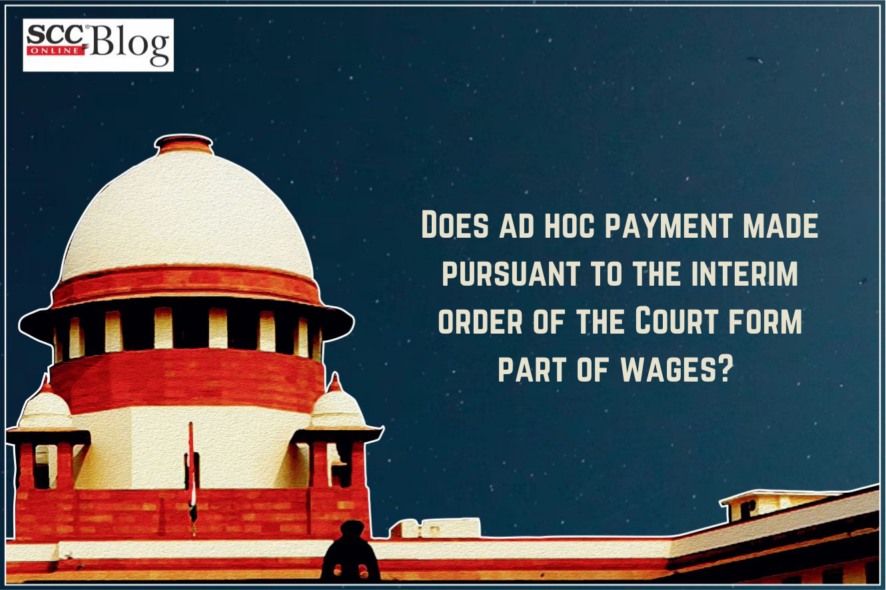Supreme Court: The bench of Hemant Gupta and V. Ramasubramanian*, JJ has held that an ad hoc payment made to the workers pursuant to the interim orders passed by this Court in a previous round of litigation does not form part of “wages” within the meaning of the expression under Section 2(s) of the Payment of Gratuity Act, 1972, for the purpose of calculating gratuity.
Factual Background
The scales of pay of the employees of public sector undertakings were revised w.e.f. 01.01.1992.
When the benefit of such revision was not made available to the employees of Fertiliser Corporation of India Limited and Hindustan Fertiliser Corporation Limited, their employees moved writ petitions in various High Courts, in the year 1996.
The writ petitions pending on the file of various High Courts were transferred to the Supreme Court.
By an interim order dated 18.08.2000, the Supreme Court directed an ad hoc monthly payment of Rs.1500/¬, Rs.1000/-, Rs.750/¬ and Rs.500/¬, respectively to four different categories of employees, as an interim measure, subject to the final outcome of the writ petitions which stood transferred to this Court.
In the final order, the Supreme Court held that economic viability or the financial capacity of the employer is an important factor which cannot be ignored while fixing the wage structure and that the materials on record clearly revealed that both these companies were suffering heavy losses for several years. It also made it clear that what was paid was only ad hoc.
Once the curtain was finally drawn on their very employment, the Controlling Authority started passing orders in the applications filed by the employees individually, treating the ad hoc payment as part of the wages.
The Management of these companies moved an application before the Supreme Court for clarification/modification of the order. On 01.05.2008, the Supreme Court disposed of the interim application by just observing that when the final order is passed, the interim order automatically comes to an end.
Analysis
Section 2(s) of the Act defines wages, as follows:-
“wages” means all emoluments which are earned by an employee while on duty or on leave in accordance with the terms and conditions of his employments and which are paid or are payable to him in cash and includes dearness allowance but does not include any bonus, commission, house rent allowance, overtime wages and any other allowance.”
The Court explained that the definition of the expression is in 3 parts,
- the first part indicating the meaning of the expression,
- the second part indicating what is included therein and
- the third part indicating what is not included therein.
In the first part of the definition, the emphasis is on what is earned by the employee “in accordance with the terms and conditions of employment”.
Hence, irrespective of whether what was earned has been paid or remained payable, the same is included in the definition, provided it is in accordance with the terms and conditions of his employment.
The Court also took note of the ruling in Straw Board Manufacturing Co. Ltd. v. Workmen, (1977) 2 SCC 329, wherein it was held that:
“We clarify that wages will mean and included basic wages and Dearness Allowance and nothing else”.
The Court also observed that it is a fundamental principle of law that a party who is in enjoyment of an interim order, is bound to lose the benefit of such interim order when the ultimate outcome of the case goes against him.
“Merely because of the fortuitous circumstance of the Voluntary Separation Scheme coming into effect before the transferred cases were finally dismissed by this Court by an order dated 25.04.2003, creating an illusion as though the last drawn pay included this ad hoc payment, it is not possible to go against the fundamental rule that the benefits of an interim order would automatically go when the party who secured it, failed in the final stage.”
Keeping in mind the above definition, if we go back to historical facts, it would be clear that the employees initiated the first round of litigation before various High Courts, for the grant of the benefit of revision of pay scales, way back in the year 1996, on the ground that the employees of other PSUs have been granted revision on par with the Government servants. It will thus be clear that what was claimed in the first round of litigation was not what was payable in accordance with the terms and conditions of employment. Therefore, this Court was clear in its interim order dated 18.08.2000 as to how 1the ad hoc payment ordered there under should be treated. Even in the final order, this Court made it clear that what was paid was only ad hoc.
The Court, hence, held that the ad hoc payment made pursuant to the interim orders will not form part of the wages. However, in view of the efflux of time and taking into account the fact that few employees are now no more, the Court directed the Management not to effect any recovery, if payment has already been made to any of the respondents or their families.
[Fertilizer Corporation of India Ltd. v. Rajesh Chandra Srivastava, 2022 SCC OnLine SC 417, decided on 07.04.2022]






